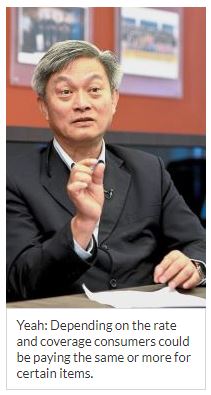Malaysia: Impact of SST
PETALING JAYA: The reintroduction of the sales and services tax (SST) in September this year will see lower prices of goods in general, but there could be a potential spike in the prices of some items, including the cost or charges for services rendered.
Tax Advisory and Management Services Sdn Bhd tax consultant Yong Min Jie told StarBiz that the sales tax is based on the manufacturing cost or import cost and if the sales tax was based on the earlier tax rate of up to 10%, then the prices of goods would come down.
“This is good for consumers unlike the goods and services tax (GST), which will result in the hike of the prices of goods. On the other hand, if this tax regime covers a wider range of services, there could be a higher price or charges for services rendered on the whole. The services rendered could be from a company to another company or from a company to an individual like professional services, etc,” Yong added
Furthermore, he noted that the cost of the implementation of the SST would not be as huge as the GST which, among other things, involved the relevant upgrading of systems. Yong said the SST is estimated to bring in RM30bil in collection for the government.
Prime Minister Tun Dr Mahathir Mohamad was quoted at a recent press briefing as saying that the SST would be reintroduced in September. The GST was zero-rated from June 1 and the reintroduction of the SST would make up for the shortfall in government revenue.
Meanwhile, AmBank Group chief economist Anthony Dass said there would be a mixed impact from the reintroduction of the SST. “We can expect car prices to move up and be higher than the GST price by approximately 2%-3%. However, there are possibilities for auto players to probably absorb the cost, as much depends on the potential demand.

“For consumer items such as food and beverage and retail, we can expect prices to be slightly lower around 3% from the savings of input costs. This will bode well for the retail business. As for property prices, ie, new houses are expected to experience a slightly cheaper price since they can save from input costs.
“On the whole, the SST is expected to create more disposable income, which, in turn, is expected to boost consumer spending and business activities. Such a rate will create adequate disposable income to spur private consumption and in turn business activities,” he said.
Dass said the amount expected to be collected from the GST was around RM44bil. Assuming there is no GST, he said the estimated contribution from the SST would be around RM28bil.
Given that the government has collected the GST from January to May and the SST would be collected from September onwards, he expects the collection to be somewhere around RM27bil.
Products and services that would be covered by the SST would see their prices increasing by a quantum similar to the rate that would be set, Sunway University Business School professor of economics Yeah Kim Leng said.
“The previous rate was 4% for products and 10% for selected services. We may see a uniform rate this time of between 4% and 10%. It could be fixed at 6% or higher to collect RM10bil to RM12bil between September till December to offset the estimated RM26bil GST forgone when the GST was zero-rated.
“Depending on the rate and coverage consumers could be paying the same or more for certain items,” he noted.
“Overall, the tax burden will be reduced by an estimated RM10bil-RM15bil. This amount is the overall increase in disposable income for consumers. Depending on the types of goods and services that will be subject to the SST, the price impact will vary by income groups according to what they consume,” Yeah added.
“On both occasions when the GST is abolished and the SST reinstated, for several months there will be opportunities for non-compliance and profiteering. The enforcement ministries, consumer groups and trade associations will have to play their respective roles to ensure the price adjustments are made correctly.
“Since prices are sticky downwards, it is important that monitoring and enforcement activities are carried out effectively,” he said.
Source: https://www.thestar.com.my/business/business-news/2018/06/04/impact-of-sst/#y62cJFdUAD7KOjPS.99


 English
English




